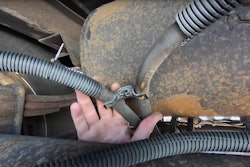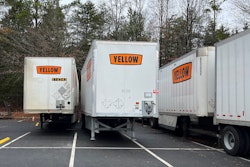Trucking news and briefs for Friday, March 3, 2023:
Two states take aim at nuclear verdicts
Lawmakers in Florida and Iowa have turned their attention toward nuclear verdicts in efforts to decrease the likelihood of exorbitant damages being awarded in lawsuits where the party being sued is mostly not at fault.
On Feb. 14, Florida Gov. Ron DeSantis announced proposed tort reform in the state that would, among other things, “institute reforms to protect small businesses from being subjected to paying exorbitant damages when they are not primarily at fault,” a press release from DeSantis said. “Under current law, fraudsters and con artists prey on small businesses by filing lawsuits when injured, even if they are up to 99% at fault.”
The proposal in Florida would also set standards for awarding medical damages “to prevent fraudulent practices that currently plague Florida’s litigation environment.” The proposed standards would require medical records, procedure codes and information related to health insurance reimbursement “to ensure accurate settlements are reached between parties.”
In Iowa, legislation has been passed in the Senate that would prevent trucking companies from being sued for ”direct negligence in hiring, training, supervising, or trusting” an employee truck driver involved in a crash. The bill has been sent to the Iowa House, where a similar bill has been passed through committee.
The passed Senate bill would limit noneconomic damages awarded in a civil lawsuit against trucking companies to $2 million, but it would not limit economic damages, such as lost wages or medical expenses. The noneconomic damages limit would not apply if the truck driver was convicted or found to be in violation of drug and alcohol regulations in connection with the crash.
Autonomous tech companies seek exemption for warning device placement
Autonomous truck technology companies Aurora and Waymo have filed a joint request to the Federal Motor Carrier Safety Administration for an exemption from several provisions related to warning device placement for stopped vehicles.
Waymo and Aurora are requesting an exemption from the warning device placement requirements of 49 CFR 392.22(b), the utilization of a warning device that does not meet the steady-burning lamp requirement of 49 CFR 393.25(e), and the utilization of a warning device for stopped vehicles that is not currently identified in 49 CFR 393.95(f).
According to FMCSA’s notice in the Federal Register, Waymo and Aurora believe it is possible to achieve the safety purpose of the warning device in an alternative way by using forward- and rearward-facing amber flashing lights mounted on the cab at a height above the upper edge of the sideview mirrors. The companies each separately tested variants of such devices and have concluded that the use of the cab-mounted warning devices was equally or more effective in enabling road users to recognize and react to the potential hazard presented by the stopped CMV.
If granted, the exemption would allow carriers to operate Waymo and Aurora autonomous trucks that stop on the traveled portion or the shoulder of a highway for any cause other than necessary traffic stops, to utilize a warning device consisting of forward- and rearward-facing cab mounted flashing amber lamps mounted at a height above the upper edge of the sideview mirrors in lieu of the currently allowed warning devices placed around the truck.
FMCSA will accept comments on the request for 30 days, beginning Friday, March 3. Comments can be filed at www.regulations.gov by searching Docket No. FMCSA-2023-0071.
[Related: FMCSA seeks more feedback on regs related to autonomous trucks]
Army veteran trucker seeks permanent HOS exemption
Truck driver and U.S. Army veteran John Olier is petitioning the Federal Motor Carrier Safety Administration for an exemption from several provisions of the hours of service regulations.
Specifically, Olier seeks a permanent exemption from the 10-hour break, the 14-hour driving window, the 11-hour driving limit, the 30-minute break requirement and the 70-hours-in-eight-days limit.
In the materials he submitted to FMCSA, Olier said he has 30 years as a licensed driver, including 11 years as an “expert driver” in the Army and five years as a CDL holder, adding that he has “never had an accident or incident involving safety.”
Olier said that as a former U.S. Army Airborne Ranger and scout/sniper, he has “extensive training in working continuous ops of 72 hours or more with little to no sleep periods.” He added that he has been trained “to recognize my body’s warning signs for fatigue and respond accordingly.”
Olier added that he has a “very different natural [sleep] cycle” that the rigidity of the HOS regs doesn’t work for.
As a refrigerate van driver, Olier said he often sleeps while waiting to be loaded and unloaded, which can be several hours and is enough for him to “function safely.” He added that over the last three years, he has “operated under various exemptions for more than 75%” of his time on the road, hauling under emergency declarations for FEMA operations, the COVID-19 emergency declaration, and while hauling ag-exempt commodities.
“Under these conditions, I have found that my time driving has been far less stressful and anxiety inducing,” he said. “I’m not rushed. I am able to run when I’m alert and sleep when I’m not.”
FMCSA will accept comments on Olier’s request for 30 days beginning Friday, March 3. Comments can be made at www.regulations.gov by searching Docket No. FMCSA-2023-0051.
Torc acquires AI-focused tech firm
Self-driving truck technology company Torc Robotics, an independent subsidiary of Daimler Truck AG, announced this week that it has signed an agreement to acquire Algolux Inc., a company with a focus on computer vision and machine learning.
“We’re thrilled to welcome Algolux to the Torc family,” said Peter Vaughan Schmidt, Torc CEO. “Algolux’s technology, at the intersection of deep learning, computer vision, and computational imaging, will help Torc strengthen key capabilities toward our commercialization of Level 4 autonomous trucking.”
Algolux has been consistently recognized for excellence in its field and has been named to the 2021 CB Insights AI 100 List of the world’s most innovative artificial intelligence startups. Torc has been working closely with the company for more than a year on multiple perception concepts and methods for robustly improving object detection and distance estimation, while evaluating synergies between the two companies.
Robust perception technology is key to helping Torc's autonomous system correctly identify objects in difficult visual conditions such as low light, fog, or inclement weather, Torc said. Algolux software is currently operating on initial Freightliner Cascadia test vehicles and is being included in areas of Torc's software development efforts.
Algolux is headquartered in Montreal, Canada, with offices in Palo Alto, California, and Munich, Germany. The transaction will close after the parties complete various pre-closing activities, including any required approvals.










